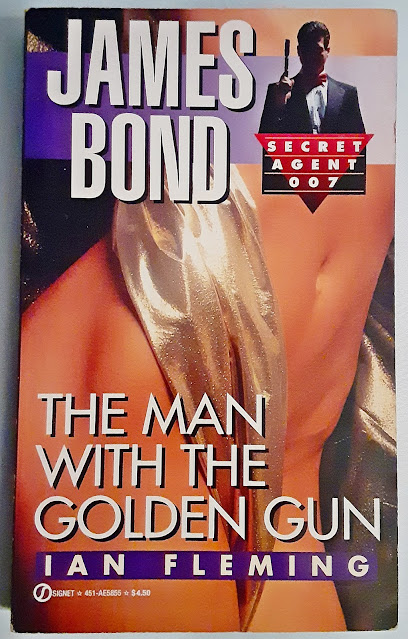Today, we're taking a look at John Gardner's third James Bond novel, Icebreaker, which I remember enjoying when I first read it about 25 years ago. Last time, I was disappointed when For Special Services failed to hold up to my initial reading of it back in the day. Will Icebreaker fare better? Read on to find out! (Or just skip to the end, if you want; I can't really stop you!) As always, I won't give away the entire plot, but there are
SPOILERS AHEAD!
CIA agent Brad Turpitz, Nicolai Mosolov of the KGB, and the MOSSAD's Rivke Ingber are Bond's teammates. It immediately becomes clear that none of the agents trust one another, and Bond himself harbors doubts about each of them. Predictably, he quickly gravitates toward the shapely blonde Rivke, despite a shocking revelation about her that directly relates to the mission at hand. With the team already splintering, Bond faces an uphill struggle to complete the mission in any capacity.
The novel has a fairly strong beginning, and the concept of the mission itself is ripe for interesting drama. It's clear early on that one of the Icebreaker agents is a double agent, actively working to destroy the team and prevent them accomplishing their mission. Naturally, a reveal is expected, and we definitely get one. Unfortunately, I found myself getting sick of all the double- and triple-crosses long before the story ended. It got to the point of self-parody, and I wouldn't have been bowled over if we'd gotten one more in the final few pages.
Another problem is the villain. Oh, did I forget to mention him in the synopsis? That right there tells you the main issue with him. Count von Gloda is an imminently forgettable villain, even more of a disappointment after the memorable nemeses in 007's first two outings under Gardner's pen. Attempts to make him seem a major threat, such as a ludicrous passage in which Bond wonders if he has finally met his match in this man, are laughable. He's as bland as they come, and that's a major sin in a series whose entries largely live or die based on the strength of their villains.
Gardner does keep things moving briskly, however, and the plot is always interesting even as it descends into absurdity at times. He does have a tendency to frequently switch between dialogue and third person narration when delivering exposition. This is a stylistic touch Gardner uses frequently, and it always mildly annoys me for some reason. Gardner constructs a torture scene so sadistic that it rivals some of those in the Fleming novels. This is easily the most gripping scene in the entire novel.The following scene, however, may well be the low point of the entire novel for me. Bond blabs a bunch of secrets he's just endured a horrendous torture to avoid spilling to the enemy, while he is still held captive within the enemy's stronghold! This only occurs to serve the plot and lead to yet another pair of double crosses, and the whole thing makes Bond look incredibly stupid. He curses himself for it a couple of pages later, offering up a very weak explanation as to why it happened, but it's clear why it really did. Gardner was a good enough writer to advance the plot in the way he desired without having Bond act so wildly out of character here, so it's annoying that events unfold in this way. It makes for a very weird scene.
NOTABLE QUOTES:
Bond did not smile. Perhaps it was his background in the Royal Navy, and working all those years close to M, but he considered smoking while someone else ate to be only a fraction above smoking before the Loyal Toast.
__________________________________________
For a flitting second, Bond experienced the strange sensation of a clammy hand running down his spine. Because he had not really met von Gloda face to face, or even read a full dossier on the man, Bond felt an unusual unease. In that fraction of time, he even wondered if, at long last, he might have met his match. (Oh, come on!)
__________________________________________
Von Gloda stood, hands clasped behind his back, a tall straight figure, every inch a soldier. Well, Bond reflected, at least he was that - not the pipsqueak military amateur Hitler had proved himself to be.
____________________________________________
"SMERSH has what I understand is called, in criminal parlance, a hit list. That list includes a number of names - people who are wanted, not dead, but alive. Can you imagine whose name is number one on the chart, James Bond?
____________________________________________
Despite the issues I had with this novel, I still enjoyed it well enough. It's not great, but not bad, either; Icebreaker is very much a middle-of-the-road 007 adventure. There is far better Bond material out there, but if you want to sample some of the non-Fleming Bonds, you can do a lot worse. There's definitely a trend being established here with these books not holding up nearly as well as I had hoped, and that's a bit worrying. I still have about a dozen more Gardner Bonds to get through, after all! Hopefully the next novel in the series, Role of Honor, will break the streak of disappointments. We'll find out together next time!
























